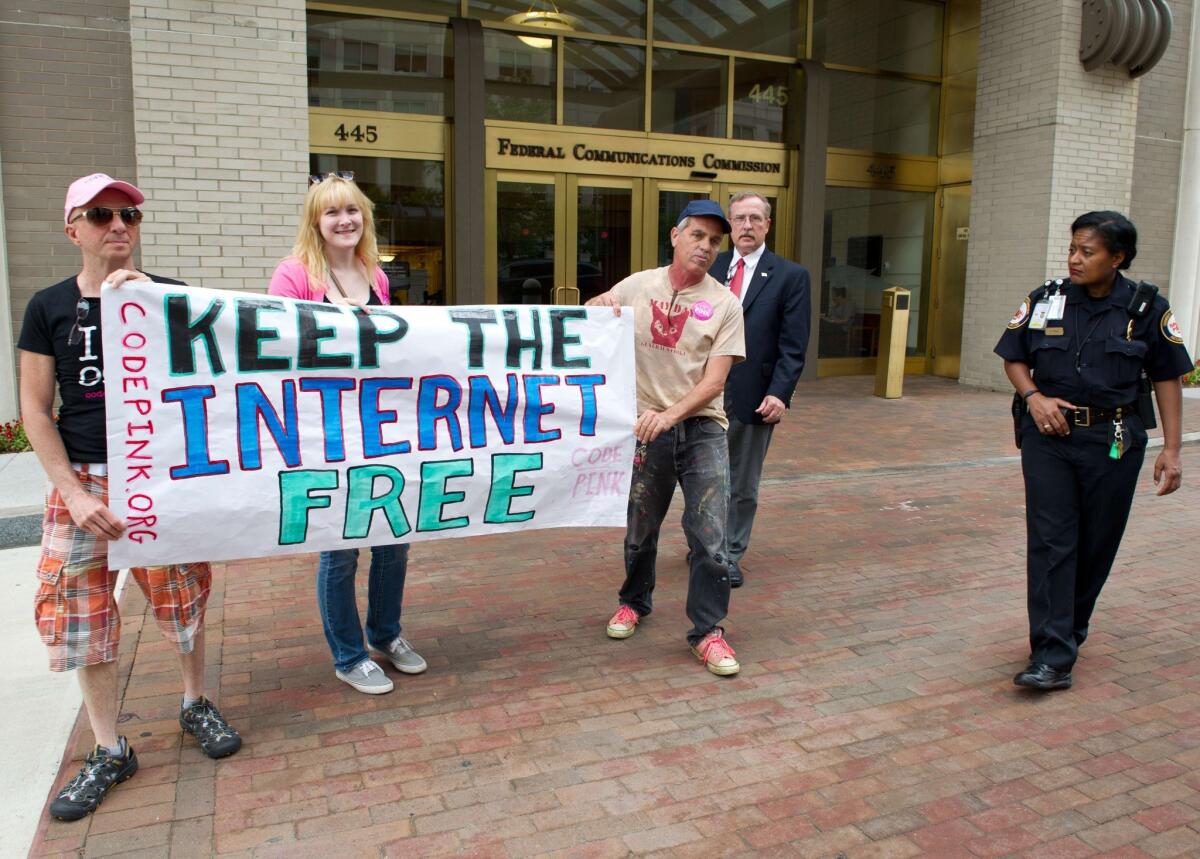Opinion: Even tough Net neutrality rules wouldn’t ‘regulate the Internet’

The most vocal opponents of the Net neutrality rules the Federal Communications Commission put out for public comment on May 15 have been the critics who say the rules won’t actually assure the Net’s neutrality. But the draft has also drawn a searing response from conservatives and libertarians, who ask why we need government to protect the neutrality produced by the free market.
That’s a fair question. But some critics go further, arguing that some tech executives and their allies want the FCC to “regulate the Internet.” The Wall Street Journal’s L. Gordon Crovitz typified this point of view with his column Monday, which carried the provocative title, “Silicon Valley Begs to Be Regulated.”
“Silicon Valley just became the first industry ever to ask to be regulated as a public utility,” Crovitz wrote. “Many of its executives are lobbying to be micromanaged by federal bureaucrats as if technology companies were 19th century railroads or the old phone monopoly.”
Except that’s not what’s happening. Silicon Valley firms are begging that a number of decidedly non-Silicon Valley companies, ones that are accustomed to life as monopolies or near-monopolies, be regulated as public utilities.
Those would be the regional phone and cable companies that are the exclusive providers of wireline broadband Internet access. In many markets, there are only two Internet service providers offering broadband to homes and apartments: the local phone company with its digital subscriber lines (or, if you’re lucky, fiber-optic ones), and the cable company with its cable modems. More than a few communities have only one of those two.
Granted, wireless phone networks now offer broadband Internet access too, particularly in metropolitan areas. But their variability and low monthly data caps make them impractical choices for even the occasional Netflix user.
Nor does the FCC have jurisdiction over the dot-coms of the world. The commission’s purview extends only to the “series of tubes” (to borrow the late Sen. Ted Stevens’ description) that connect the public to websites and online services, not to the content they deliver. And the neutrality (or “open Internet”) rules would regulate traffic management on just the last mile of tubes.
The approach favored by some Silicon Valley executives -- and, more vociferously, by Washington-based tech advocacy groups that claim to represent the public -- would extend to broadband access services the strict, utility-style regulatory regime that applies to plain old telephone service. By making broadband access subject to that regime, which is codified in Title II of the federal Communications Act, the FCC could prohibit ISPs from favoring any site or service’s data over any other’s the same way phone companies are prohibited from discriminating between callers.
That’s a much more intrusive role for government to play than it does today, and more stringently regulatory than FCC Chairman Tom Wheeler’s proposal to prohibit ISPs from striking deals with websites, apps and services only if they’re “commercially unreasonable.” All the same, even the Title II approach wouldn’t regulate what most people consider to be the Internet, which is the content conveyed by the bits that travel through the ISPs’ networks. Crovitz’s argument is akin to saying that advocates of tougher standards for highway construction want to control what Fed Ex puts in its trucks.
Opponents of using Title II might argue that the FCC would still be regulating content providers by prohibiting the sort of deals with ISPs that some of them need to make their services viable. It’s conceivable that some unusually bandwidth-intensive apps might not be feasible if an ISP can’t carve out a pathway for them. The same could be said for services that don’t work unless their bits can’t be held up by congested networks -- a home medical service that involves real-time monitoring of vital signs, for example.
But barring ISPs from doing unreasonably discriminatory deals wouldn’t necessarily stop them from selling managed services on a non-discriminatory basis to content providers and apps with unusual bandwidth needs, provided that they continued to supply ample bandwidth to everyone else. The FCC left the door open to such managed services in 2010, when it adopted the last, ill-fated set of neutrality rules. Nor would such a stricture prevent standards bodies from coming up with technical ways to let developers and ISPs assure higher quality of service for medical apps and the like.
What many Silicon Valley executives want out of neutrality rules is the assurance that ISPs don’t degrade their traffic -- and the viability of their offerings online -- by letting companies buy their way to the head of the queue. In other words, they want a certain ban on paying for prioritization, and they don’t believe the FCC can go that far without using Title II.
To Crovitz, though, it’s a slippery slope. Barring that sort of discrimination by last-mile ISPs will just invite the FCC to regulate other entities online. He cites a warning by FCC Commissioner Michael O’Rielly, a Republican, who said lobbyists would soon be calling for rules against search algorithms and operating systems.
Again, that’s confusing how the pipes are managed with the data that travel through them. There’s a line between the two bright enough to light up a cluster of fiber-optic cables. And yet people continue to trip over it, perhaps because they’re being willfully blind.
More to Read
A cure for the common opinion
Get thought-provoking perspectives with our weekly newsletter.
You may occasionally receive promotional content from the Los Angeles Times.











